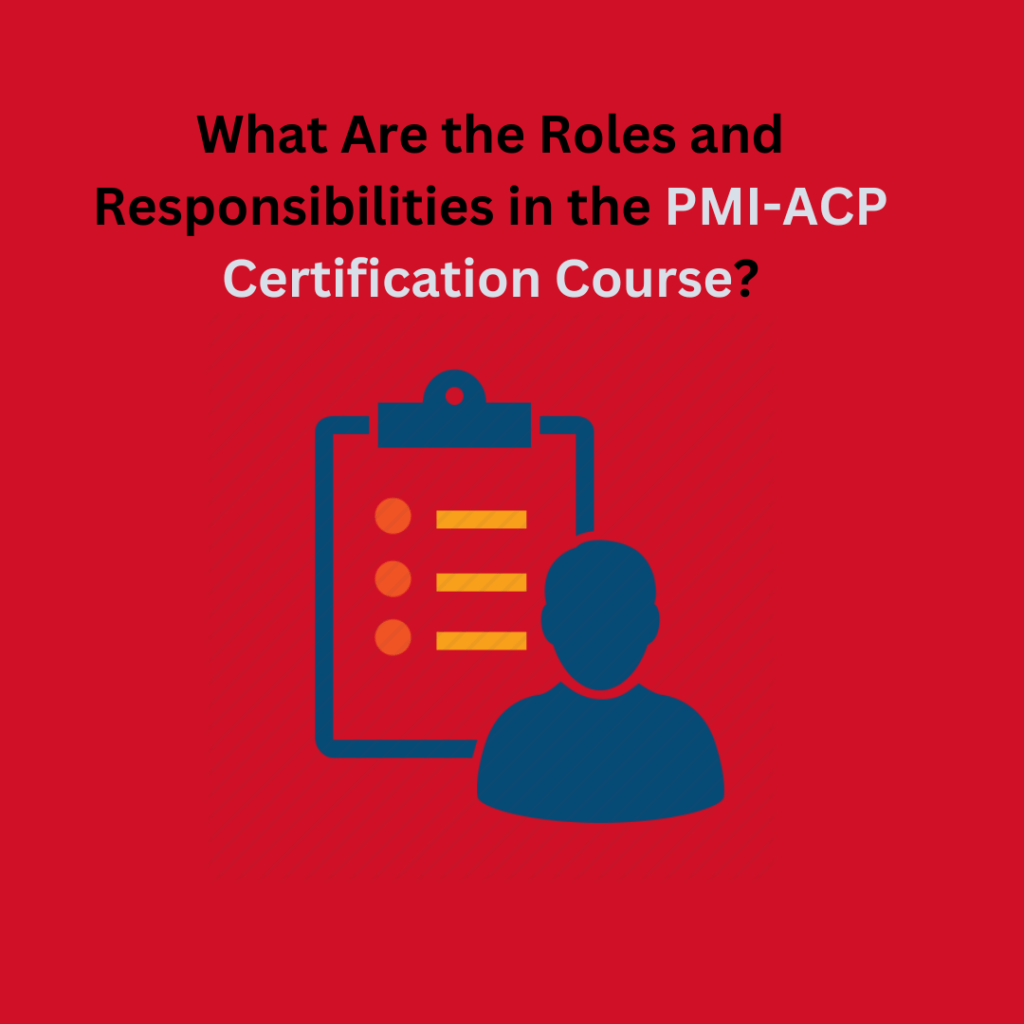Introduction :-
The PMI-ACP® (Project Management Institute – Agile Certified Practitioner) certification is designed for professionals looking to deepen their understanding and expertise in Agile practices. As Agile methodologies have become increasingly prominent across industries, the demand for skilled practitioners capable of leading Agile projects has soared. The PMI-ACP Certification course not only validates your knowledge of Agile but also prepares you to excel in various roles with clearly defined responsibilities. Let’s explore the roles and responsibilities that this certification equips you for.
—
1. Understanding the PMI-ACP Certification
The PMI-ACP certification incorporates various Agile methodologies, including Scrum, Kanban, Lean, Extreme Programming (XP), and more. It is designed for professionals involved in Agile projects who want to broaden their skill set and manage Agile processes effectively.
The course curriculum focuses on Agile principles, tools, techniques, and practices, providing a comprehensive understanding of how to manage projects in a fast-paced, iterative environment. Upon completing the certification, professionals are well-prepared to take on several key roles within Agile teams and organizations.
—
2. Key Roles You Can Take On After PMI-ACP Certification
a. Agile Project Manager
An Agile Project Manager ensures that projects adhere to Agile principles while delivering value to stakeholders. Their primary responsibilities include:
– Assisting with Agile rituals such as retrospectives, stand-ups, and sprint planning.
– Monitoring project progress and removing roadblocks.
– Communicating project status and ensuring alignment with organizational goals.
– Balancing scope, budget, and timelines while prioritizing customer satisfaction.
b. Scrum Master
As a Scrum Master, you act as a servant leader for the team, fostering collaboration and ensuring adherence to Scrum principles. Responsibilities include:
– Coaching the team on Agile practices and frameworks.
– Protecting the team from external disruptions.
– Identifying and eliminating impediments that hinder team productivity.
– Use retrospectives to foster a culture of ongoing growth.
c. Agile Coach
Agile Coaches work at a strategic level to guide teams and organizations in adopting Agile practices. Their role involves:
– Driving organizational change to foster an Agile mindset.
– Training teams and stakeholders on Agile frameworks and principles.
– Mentoring team members to improve performance and collaboration.
– Ensuring that Agile processes align with business objectives.
d. Product Owner
A Product Owner bridges the gap between stakeholders and the development team, focusing on delivering maximum value. Key responsibilities include:
– Defining and prioritizing the product backlog.
– Ensuring clear communication of requirements to the development team.
– Ensuring that the development team is informed of requirements in a clear and concise manner.
– Coordinating the team’s activities with the strategic objectives of the company.
e. Team Member in Agile Development
PMI-ACP-certified individuals are also equipped to contribute effectively as team members. Their responsibilities involve:
– Collaborating with the team to achieve sprint goals.
– Delivering high-quality work in iterative cycles.
– Actively participating in Agile ceremonies and providing feedback.
– Continuing to concentrate on providing solutions that are customer-centric.
—
3. Responsibilities Across Agile Roles
Regardless of the specific role, PMI-ACP professionals share common responsibilities to uphold the Agile mindset. These include:
– Fostering Collaboration: Promoting teamwork, transparency, and open communication among team members and stakeholders.
– Adapting to Change: Embracing flexibility and adapting to evolving project requirements.
– Ensuring Quality: Delivering high-value products or services by incorporating continuous testing and feedback loops.
– Driving Value: Focusing on outcomes that deliver measurable business value to customers and stakeholders.
– Promoting Continuous Improvement: Encouraging regular reflection on processes to identify opportunities for improvement.
—
4. Why These Roles and Responsibilities Matter
Agile projects require dynamic leadership, adaptability, and a focus on delivering value. The PMI-ACP certification ensures that professionals are equipped with the skills to excel in their roles, whether managing projects, coaching teams, or contributing as active team members. Organizations benefit from these skilled practitioners by achieving greater efficiency, faster time-to-market, and improved customer satisfaction.
—
Conclusion
The PMI-ACP certification prepares professionals to take on a variety of roles within Agile environments, including Agile Project Manager, Scrum Master, Agile Coach, Product Owner, and development team member. Each role comes with distinct responsibilities, but all share a common commitment to Agile principles such as collaboration, adaptability, and continuous improvement. By earning the PMI-ACP certification, you not only enhance your career prospects but also gain the skills needed to drive successful Agile projects and deliver exceptional value to stakeholders.












